Step 1. Explore the Options
The first question that comes to mind is where to buy a website. There are three major places to explore: in a marketplace, through a broker, or directly from the owner. Each option has its own pros and cons that you should consider. We will discuss each of them in detail.
Website Marketplace
These are online platforms where you can buy a website through an online auction or make a private offer. In case of an auction, you need to make a bid, and the highest bid closes the deal. Alternatively, you can make a private offer to the seller and negotiate the price. Usually, online marketplaces feature sites with a total annual income not exceeding an average of $100k.
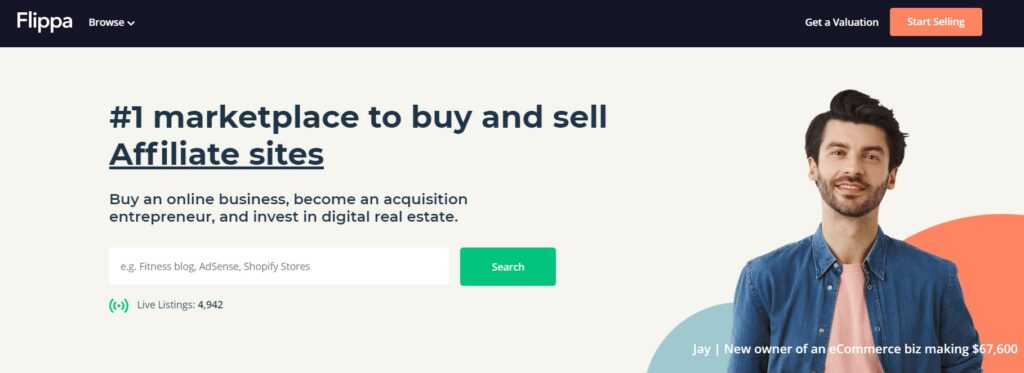
The most popular marketplace is Flippa, but there are many good alternatives, such as Exchange Marketplace, SitePoint Marketplace, Side Projector, Freemarket BuySell Empire, Newegg Marketplace.
Pros:
- All the offers are publicly available
- There is a wide choice of websites for sale in any niche
Cons:
- You need to evaluate each site on your own
- There is a risk of scammers
- Some platforms require a deposit before opening access to the list of sites
- Prices might get really high in the case of an auction
Website Broker
Brokers are mediators between website owners and potential buyers. They have expertise in the field and are able to help you navigate a wide range of options, evaluate preferred sites, and close the deal. Brokers usually represent websites with high revenues and always take a commission for their services.
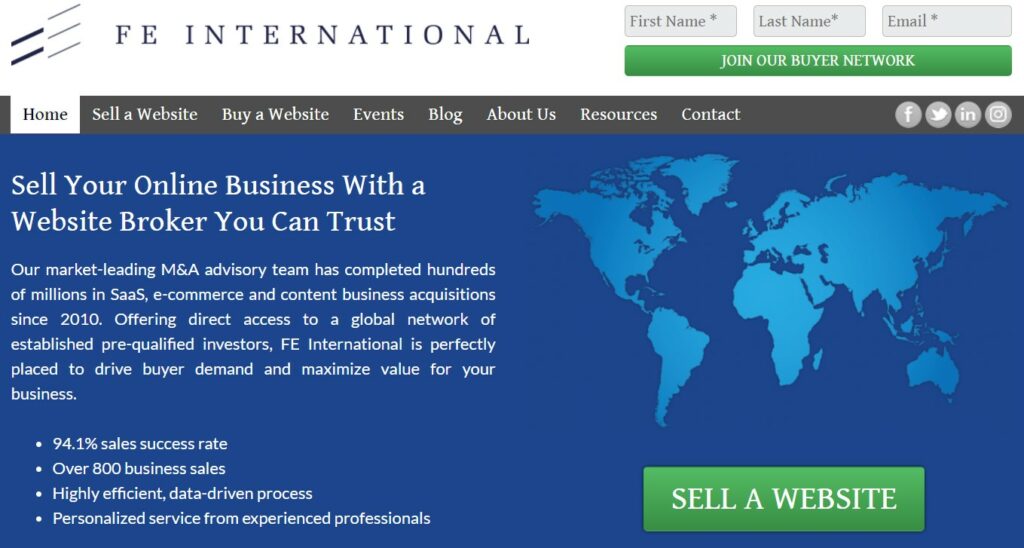
Some of the most popular brokers today are: Empire Flippers, FE International, and Digital Exits.
Pros:
- Brokers independently evaluate website quality and provide guarantees for the buyer
- Brokers usually take on the financial, legal, and technical aspects associated with the transaction
- You save time on finding the right site because the broker selects the best options for you, based on your goals
Cons:
- The cost of sites sold through a broker is higher than normal
- Fees for a broker’s work ranges from 5% to 15% of the transaction amount
Directly From the Owner
Buying a website directly from its owner is another alternative. You can explore websites in your niche and contact the owners of the ones you like. It’s also a good idea to explore dedicated forums and social media groups, such as Flipping Websites, and see what offers people are discussing there.
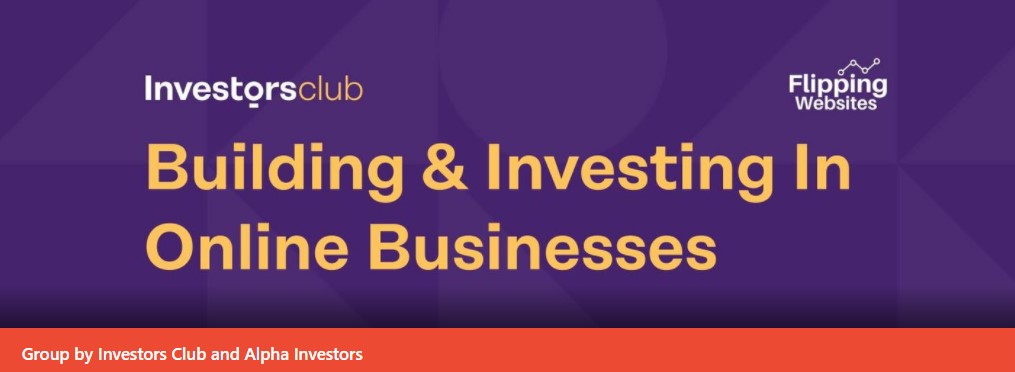
You can make a list of sites that you would consider acquiring and start checking their parameters. If there are any websites you like, it’s possible to check similar resources through services like SEMrush.
Pros:
- An opportunity to negotiate the price with the seller
- No need to pay the fee
- There might be less competition
Cons:
- Risk of scammers, so you need to check each site on your own
- No guarantees
- It might take time to navigate available options and make a choice
Step 2. Evaluate the Offers
Once you’ve found a few websites that seem to be good value, it’s time to carefully examine their most important indicators that will impact your business later. So, what should you check?
History
This one is pretty straightforward: the older the website, the more traffic and audience it is likely to boast, thus, the higher its price. Website owners are supposed to disclose the age of their website, but you can also check on your own using services like Whois.
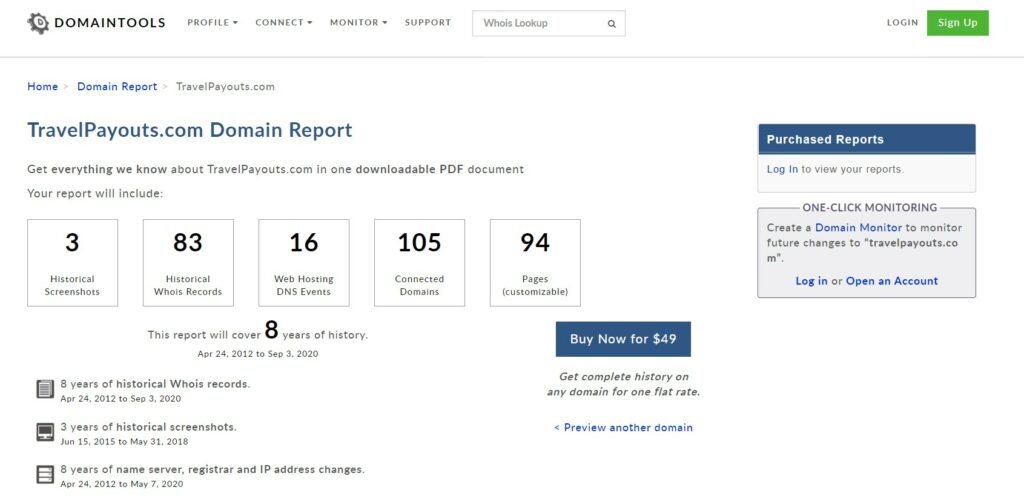
It’s also vital to monitor changes that have been made to the website over time. Even if the design and content quality is fine now, it may have been different in the past. With the help of certain online tools, such as Wayback Machine, you can see older versions of websites.
Traffic
You can check the website’s traffic through counters on the site, which might not always show accurate data or by asking the seller for access to Google Analytics. In China, it is Baidu Tongji.
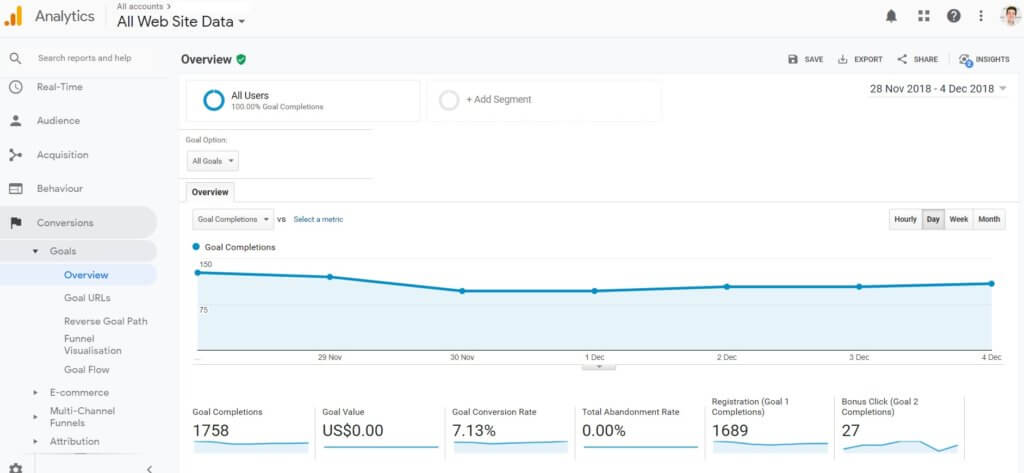
Without contacting the seller, you can check the site via SEMrush or Serpstat.
Pay attention to the dynamics and quality of traffic. While the seasonal decline in the number of visitors is fine, you need to check other drops in traffic. In addition, do not forget to find out if traffic is evenly distributed across the site. If visitors primarily visit one or two pages on the site, it might require changes.
Finally, remember to learn about traffic sources. This will be important if you decide to make money through ads or affiliate marketing.
Revenue and Monetization Methods
If you want to buy profitable websites, remember to check their financial reports. You can do this through PayPal or any paper report that clearly shows the revenue and expenses. In addition to getting the real figures, you will be able to understand whether there are seasonal drops, as well as evaluate the ratio of traffic and advertising costs.
The next important point is to determine how you will make money on your website in the future. Evaluate if all the channels that you would like to use are available, such as product sales, subscriptions affiliate revenue, or on-site advertisements.
Evaluate the payback — how much the price of the site corresponds to what you can get out of it. Usually, payback is normal if the period does not exceed three years of current income from the site. Don’t forget to factor in maintenance costs. How much money does a site need to maintain its monthly performance? Are you ready to spend the same amount, and even more, to implement your ideas?
Social Media Presence
Social media presence is another advantage that allows you to reach a wider audience and leverage more marketing channels. It is also an opportunity to build relationships with existing customers, strengthen their loyalty, and increase your web traffic.
Email List
An established resource is likely to have an email list with the contact information of its subscribers, so make sure to include this item on your purchase list. This is a competitive advantage that will help you leverage email marketing to promote the website.
It’s essential to understand where these emails come from. For example, if a former website owner purchased them from a reseller, this database might contain irrelevant addresses. On the other hand, emails collected naturally through signup forms will be an asset.
Backlinks
Backlinks are various types of active hyperlinks located on various Internet resources that link to one site. Very often, these backlinks are artificially built up through purchases in order to promote search queries. The more backlinks a website has, the higher its potential.
To check the backlink profile, use services like Ahrefs, Serpstat, or Moz (to name a few). Remember that not all backlinks are useful — backlinks from suspicious or low-quality resources will affect your website’s credibility.
Target Audience
Another indicator of a successful site is an established target audience that matches your goals. You can check the comments section on the website and social media groups to analyze what kind of people the platform attracts.
It’s also possible to monitor the project’s performance with the help of dedicated tools, such as BuzzSumo. This platform allows you to check brand mentions so you can discover what people think about the project you want to take over.
Maintenance Costs
That’s definitely a point to consider wisely. A good project is always self-sustainable, so you don’t have to allocate any additional budget. Basic maintenance costs include domain, website hosting, CMS, technical support, analytics, etc.
While the monthly maintenance cost of a personal blog starts from as little as $5 to $25, an ecommerce website will cost you from $1,500 per month.
Website Reputation
Start by checking the domain’s reputation. If the site is known for generalized content, viruses, prohibited materials (for adults, extremism, drug propaganda), poor-quality links, re-optimized articles, or spam, then the domain name is most likely blocked by most filters. With the help of dedicated services, you can check for domain blacklisting, website errors, and the global ranking.
Another thing to consider is the project’s reputation within the community, which includes reviews of the website, the general perception of the audience, their engagement on the website, and more
Step 3. Make a Purchase
Once your choice is made and you’re satisfied with the results of your audit, it’s time to strike a bargain. To make things go smoothly, try to address every aspect of the purchase to ensure you’re on the safe side.
Pick a Safe Payment Option
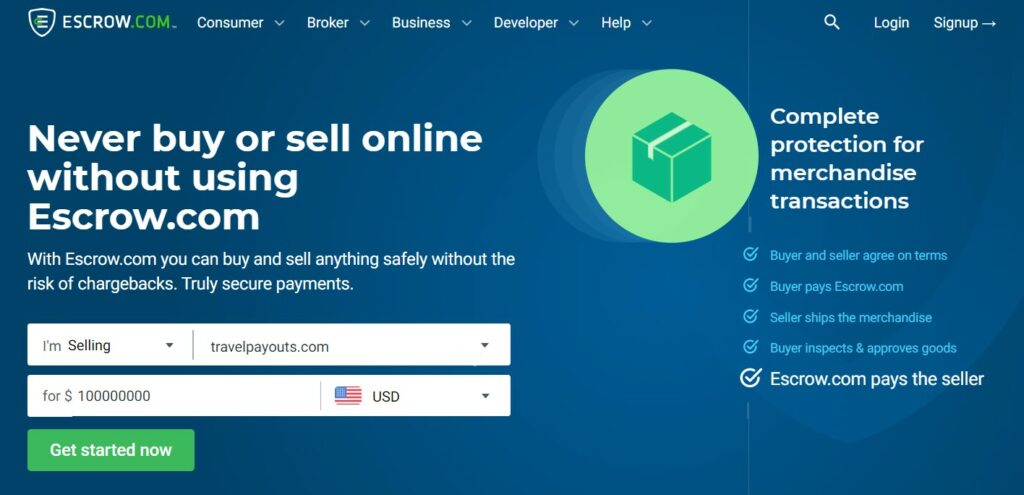
It’s best to make a purchase through an escrow service such as Escrow.com. This guarantees safety for both the buyer and the seller, as payment is first transferred to an independent third party (the guarantor) and remains there until the order is transferred and verified by the buyer. Thus, the buyer receives a guarantee that they will get their money back if the seller does not send the order or if its contents do not match the description.
Take It for a Test Drive
Before making your final decision, take the site for a test drive. This will allow you to check all the technical points in action and see things from inside. If the seller is reliable and interested in selling, they will be happy to allow you to test out the site.
The testing process, most likely, will be carried out in a limited capacity (as giving full access would be unsafe for the current owner). However, this can be enough for you to understand what constitutes a resource that you intend to purchase.
Consider Making a Contract
Drafting a contract might be a complex and costly process. However, it can ensure you against many risks, especially if you buy a website directly from the owner and not through a trading platform or broker. Make sure to:
- Identify the subject of the contract and what is included in the sale, such as the domain name, trademarks related to any brands that are used on the site, content, databases, design and other graphic elements (photos), programs, and other objects that make up the site.
- Define responsibility. Indicate the extent to which the seller is responsible to the buyer, such as what property losses associated with trademarks or copyrights will be reimbursed by the seller after the purchase of the site.
- Set the deadlines. Include clear deadlines in your contract for transferring files to the customer’s hosting, changing user passwords on the site, sending statistics passwords, freelancer contacts, etc.
Add a Non-compete Clause
A non-competition clause deserves special attention in your contract. The former owner of the site, with certain knowledge and connections, can easily create a competing resource and undermine your authority. In order to avoid such competition and avoid a loss of profit, add a non-competition clause to the contract, which prohibits creating an identical website.
Ask for a Period of Support
Better safe than sorry. Anything can go wrong, from bugs in setting up advertising to minor technical issues. Therefore, it is better to ask the seller for after-sales support over a limited time. Two to three months is typically enough to learn everything you need to troubleshoot problems.
Know How to Get Your Money Back
Finally, think about escape routes. It is better to use services that allow you to return the money if something goes wrong. For example, Escrow.com or PayPal. In addition, pay attention to the conditions for making and terminating transactions, including refunds, in the country where you make the purchase. Minimizing risks is always better than being taken by surprise.
How to Check a Website: Case Study
To make things easier for you, we present an example of how to analyze a website before making a purchase. Below, you’ll find our evaluation of the Maps of World website found in the Flippa marketplace.
| Indicator | Data | Interpretation |
| Age of the site | The site is 20 years old. | This is a great indicator. A good website age starts from 3-5 years. |
| History of the site | Content and design have been updated. The contacts and site owner remain the same. | By clicking on snapshots, you can see that the site periodically updated its design and content, but the general message remained the same. |
| History of the domain | For the entire existence of the domain, it had a single owner. | This item does not need any further comments. 20 years under the control of the same person indicates an established authority in the niche and a strong audience. |
| Links | Inbound links: 16,482 from 560 domains. Outbound links: 10,000 to 2,800 domains | This is a good rate. It indicates how popular the resource and its content are on the Internet. Most links are issue-related (74%). |
| Traffic | Weekly average visibility: 168,000 impressions in the USA | This is a good rate. |
| Site indexing | Yandex Indexing – 74,000Bing Indexing – 970,000 | We checked on indexing using the RDS Bar extension. The site is well-indexed in both Yandex and Bing. It’s better to clarify the settings in Google with the seller. |
| Search Engine Penalties | The site is not on any blacklist. The scanner didn’t detect any malware. | This is another positive indicator. |
| Social media presence | The site has a presence on Facebook, Twitter, Instagram, Pinterest, and LinkedIn. | There are a large number of subscribers on Facebook, but with low activity. On other social media platforms, there are few subscribers. |
| Website speed | The PageSpeed score is just 9% (an average score is 73%). Fully Loaded Time is 29 sec. | It might be necessary to make some (non-critical) changes, such as reduce the size of images and get rid of a number of outgoing links to improve the situation. |
All in all, the domain has a decent age and a spotless reputation. The indexing of the pages is also quite acceptable. The site is visible in search engines, has decent traffic, and has a good backlink profile. On the technical side, there are some small complaints in terms of speed, but these can be addressed. No visible filters or search engine blocks were found.
With the right approach to improvements and SEO promotion, the site has a high potential for development, traffic growth, and building a permanent audience.
Things to Remember When Buying a Website
To make the right choice and not regret your purchase later, make sure to evaluate as many site metrics as possible. A competent analysis includes traffic and target audience, monetization methods, site reputation, and more. Make sure to choose a safe payment method. The tips above will help you easily find a great website and will also be useful for selling it later, if that’s what you decide.




